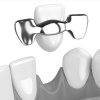Crowns
Dental crowns are “caps” that is placed over a tooth or teeth to cover it, protect it, restore its shape, size and strength and improve how it appears. When cemented in place, they fully cover the entire visible area of the tooth that is present above the gum line.
When are Dental Crowns Necessary? 
Your Springfield dentist will determine when you need a crown, but here are some common reasons for them:
- To protect a weak tooth from something like decay, from breaking or to hold together parts of a cracked tooth
- To restore a tooth that has been broken or severely worn down
- To cover and support a tooth with a large filling where not much of the tooth remains
- To hold a dental bridge in place
- To cover a misshaped or severely discolored tooth
- To cover a dental implant
- To make a cosmetic adjustment
For small children this type of tooth protection may be used on baby teeth to:
- Save a tooth that has been damaged by decay when it cannot support a filling
- Protect the teeth of children at a high risk for tooth decay
- Reduce how often children that have issues or medical conditions which make it difficult for them to maintain good oral hygiene go under general anesthesia
What Types of Crowns Are Available?
They can be produced from a variety of materials by your Springfield dentist. Here are some examples:
- Stainless steel. These are usually only used while a permanent crown is being made Metals. These can consist of gold alloy, other alloys or a base-metal alloy such as nickel or chromium. They have the most longevity, but the color is often considered unattractive for teeth that are in the front of the mouth
- Porcelain-fused-to-metal. They can be color matched to nearby teeth and also quite strong, but can chip or break
- All-resin. These are less costly than other types, but do not wear well over time.
- All-ceramic or all porcelain. These are a great option for people who are allergic to metal and also can match the natural teeth in color. They are excellent for front teeth
- Temporary. These can be made in the dentist’s office while permanent must be made in a lab
- Zirconia or milled. They are digitally constructed either in an office that specializes in this and no temporary crown or impression is necessary.



